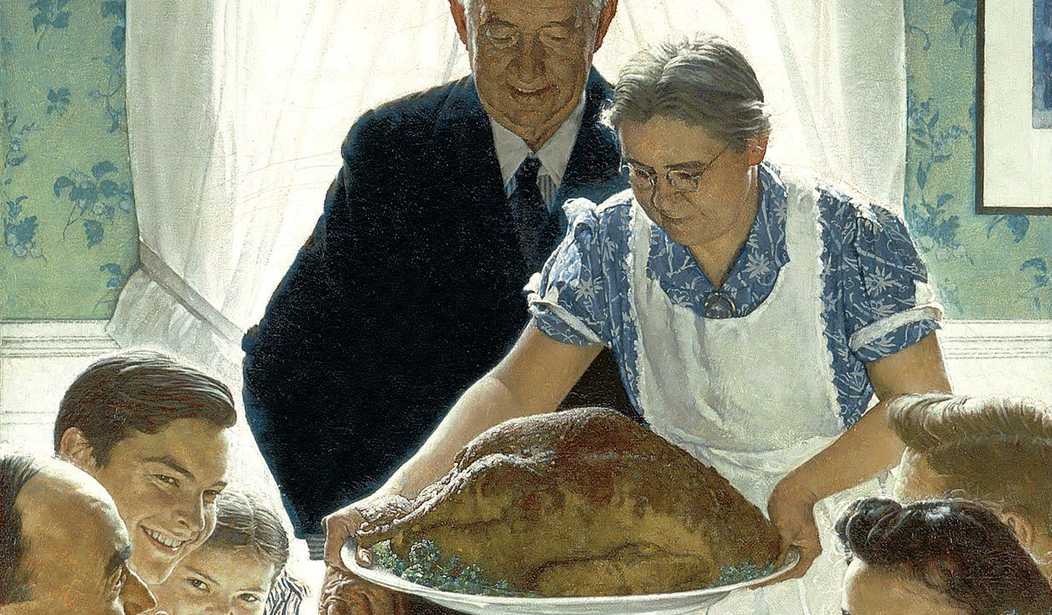One of the most important virtues, which is disturbingly rare today, is gratitude. Americans — particularly young people — now act as if the world owes them happiness and prosperity no matter what they do. But our forefathers knew better. From Washington to Lincoln, from Florida to Massachusetts, they understood that all goods come from God and we owe Him gratitude in return.
G.K. Chesterton once said, “I would maintain that thanks are the highest form of thought and that gratitude is happiness doubled by wonder.” He was English, not American, but he was a great admirer of the Founding Fathers, and his statement can certainly inspire us as we celebrate Thanksgiving today. Part of the reason modern Americans are so unhappy, even when we have luxuries that most people throughout history could not imagine possessing, is that we are not grateful.
Gratitude is a necessary prerequisite for happiness, and God meant it to be that way. We see thanks offered to God throughout the Bible; even Jesus, Who was both God and man, prayed, “I thank thee, Father” (Matt. 11:25). When the first Europeans came to the New World, they, too, thanked God.
The first thing Christopher Columbus did upon landing in the New World was to fall to his knees and offer prayers of thanksgiving, including the Te Deum. Then, in 1565, the first Thanksgiving meal was celebrated in what would become the United States of America. No, I didn’t get that date wrong! I’m not talking about the Pilgrims, but about the Spanish settlers led by Pedro Menéndez de Avilés who founded St. Augustine’s in what is now Florida.
The Catholic settlers gathered for a Mass of thanksgiving, particularly fitting since the Greek word for Holy Communion is Eucharistos (Eucharist) or “thanksgiving.” They then held a celebratory meal, according to Tampa Bay 10, citing a historical account: “Menéndez laid out a meal to which he invited as guests the native Seloy tribe who occupied the site.” And there you have it — the first Thanksgiving!
Of course, the meal that Americans call the first Thanksgiving, the one that began the idea of a yearly feast to thank God for plenty, occurred more than half a century after the above meal. When the Pilgrims arrived in what is now Massachusetts, seeking a new life without religious persecution, they did not immediately experience success. Many of them died that first terrible winter, including almost 80% of the women.
When the few adults and some children who survived had a successful harvest in 1621, they wanted to gather for a celebratory feast. They had food, they were alive, and they were deeply religious, so they knew Whom to thank for their current success. The Indian chief Massasoit and his men joined in the feast, contributing venison to the repast. There doesn’t seem to be evidence that the Pilgrims intended to establish an annual official holiday, but that first Thanksgiving meal in the colonies has inspired many Americans who came after the Pilgrims.
Indeed, in 1789, the father of his country, George Washington, called for the first national Thanksgiving day:
Now therefore I do recommend and assign Thursday the 26th day of November next to be devoted by the People of these States to the service of that great and glorious Being, who is the beneficent Author of all the good that was, that is, or that will be — That we may then all unite in rendering unto him our sincere and humble thanks…
[A]nd also that we may then unite in most humbly offering our prayers and supplications to the great Lord and Ruler of Nations and beseech him to pardon our national and other transgressions — to enable us all, whether in public or private stations, to perform our several and relative duties properly and punctually — to render our national government a blessing to all the people.
In the true republican spirit, Washington specifically reminded Americans that here we have only one king, one “Ruler,” God. But he also reminded everyone that gratitude is absolutely necessary if our nation is to thrive and prosper.
Finally, in 1863, following a letter from elderly magazine editor Sarah Josepha Hale urging an established national Thanksgiving holiday, Abraham Lincoln and his Secretary of State, William Seward, proclaimed the holiday we know today. Seward and Lincoln’s proclamation, later sold to benefit the Union troops fighting to reunite America and end slavery, said:
“I do therefore invite my fellow citizens in every part of the United States, and also those who are at sea and those who are sojourning in foreign lands, to set apart and observe the last Thursday of November next, as a day of Thanksgiving and Praise to our beneficent Father who dwelleth in the Heavens.”
May you have a blessed and happy Thanksgiving, surrounded by those you love — and filled with joyous gratitude!










Join the conversation as a VIP Member